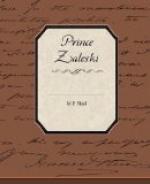‘And in the old will, was Mdlle. Cibras provided for?’
‘Yes,—that at least was correct.’
A shadow of pain passed over his face.
‘And now,’ I went on, ’I come to the closing scene, in which one of England’s foremost men perished by the act of an obscure assassin. The letter I have read was written to Maude Cibras on the 5th of January. The next thing that happens is on the 6th, when Lord Pharanx left his room for another during the whole day, and a skilled mechanic was introduced into it for the purpose of effecting some alterations. Asked by Hester Dyett, as he was leaving the house, what was the nature of his operations, the man replied that he had been applying a patent arrangement to the window looking out on the balcony, for the better protection of the room against burglars, several robberies having recently been committed in the neighbourhood. The sudden death of this man, however, before the occurrence of the tragedy, prevented his evidence being heard. On the next day—the 7th—Hester, entering the room with Lord Pharanx’s dinner, fancies, though she cannot tell why (inasmuch as his back is towards her, he sitting in an arm-chair by the fire), that Lord Pharanx has been “drinking heavily.”
’On the 8th a singular thing befell. The earl was at last induced to see Maude Cibras, and during the morning of that day, with his own hand, wrote a note informing her of his decision, Randolph handing the note to a messenger. That note also has been made public. It reads as follows:
’"Maude Cibras.—You may come here to-night after dark. Walk to the south side of the house, come up the steps to the balcony, and pass in through the open window to my room. Remember, however, that you have nothing to expect from me, and that from to-night I blot you eternally from my mind: but I will hear your story, which I know beforehand to be false. Destroy this note. PHARANX."’
As I progressed with my tale, I came to notice that over the countenance of Prince Zaleski there grew little by little a singular fixed aspect. His small, keen features distorted themselves into an expression of what I can only describe as an abnormal inquisitiveness —an inquisitiveness most impatient, arrogant, in its intensity. His pupils, contracted each to a dot, became the central puncta of two rings of fiery light; his little sharp teeth seemed to gnash. Once before I had seen him look thus greedily, when, grasping a Troglodyte tablet covered with half-effaced hieroglyphics—his fingers livid with the fixity of his grip—he bent on it that strenuous inquisition, that ardent questioning gaze, till, by a species of mesmeric dominancy, he seemed to wrench from it the arcanum it hid from other eyes; then he lay back, pale and faint from the too arduous victory.
When I had read Lord Pharanx’s letter, he took the paper eagerly from my hand, and ran his eyes over the passage.




